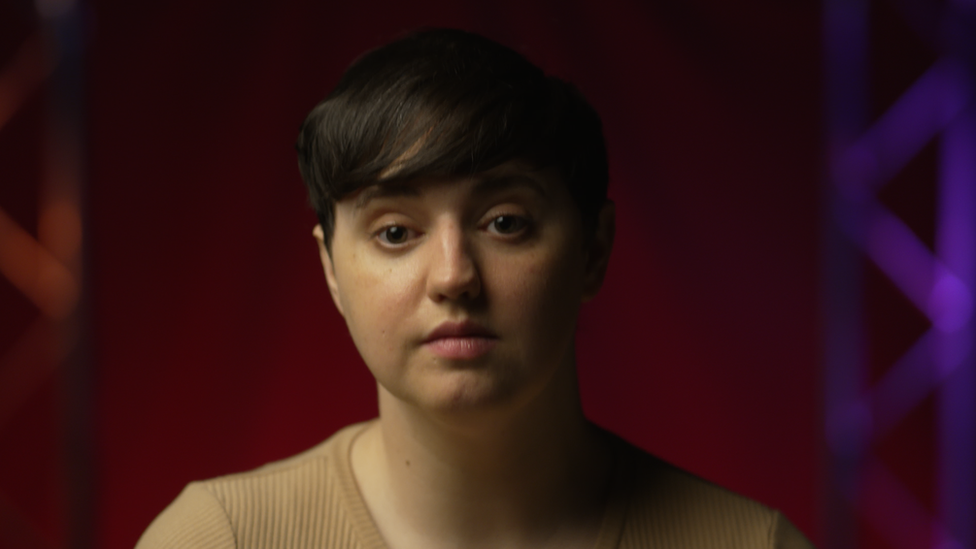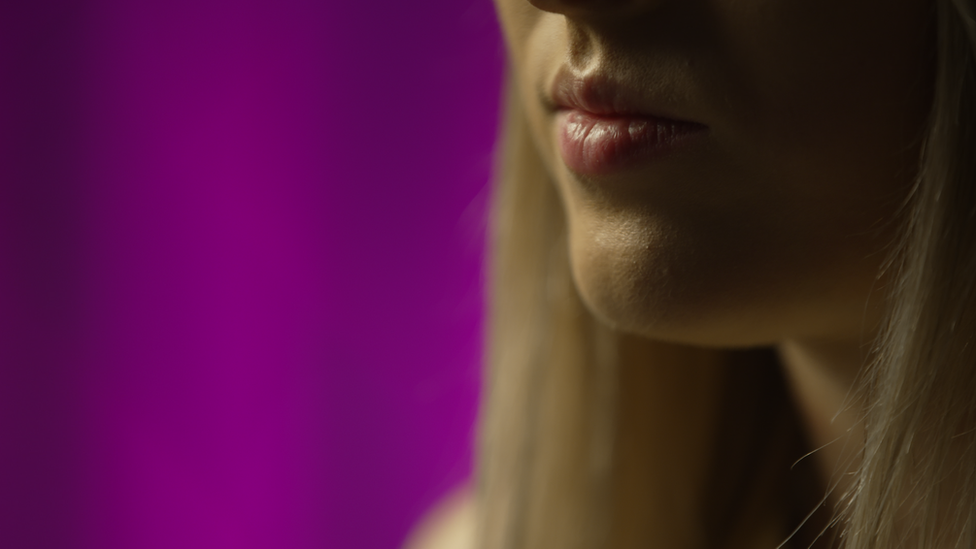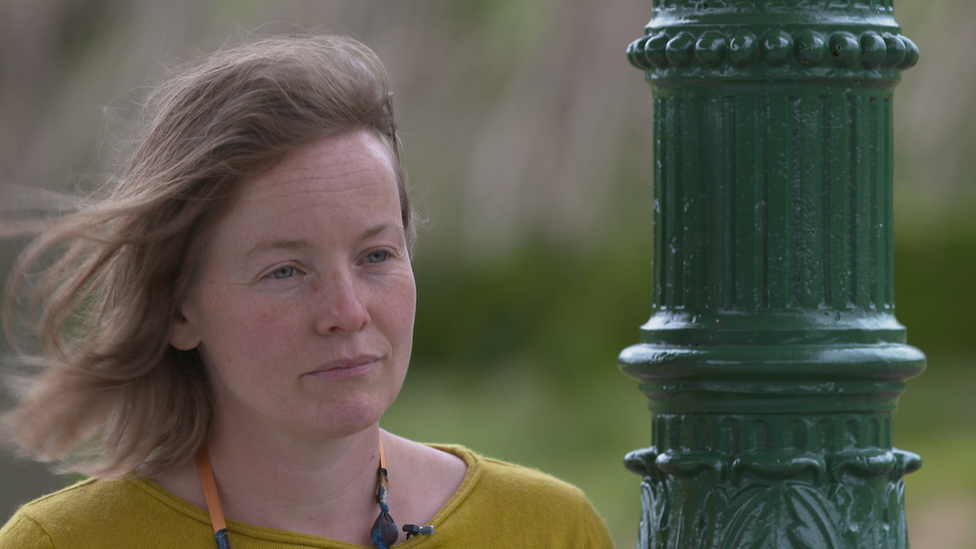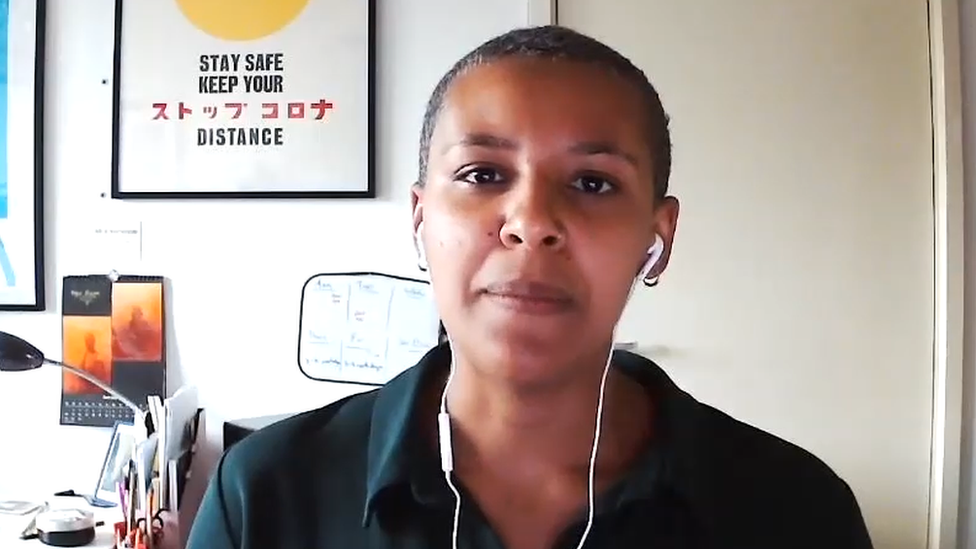Young teenagers 'were not protected' from predators at gigs
- Published

Sam says not enough was done to protect children from "predatory behaviour" at gigs and in venues.
The pandemic has shut down Scotland's nightlife and music scene but as venues prepare to reopen some young women are thinking again about their experiences on nights out and at gigs when they were underage.
Sam says she was 15 years old when she was assaulted by a man after watching a local band play at a gig in Dumbarton.
She says he pushed her up against a wall and he tried to make her kiss him. He was "persistent" and "aggressive", she says.
"Looking back on that particular night I was scared," she says. "I was scared about what might happen when I left."
The lower age limit for concerts in Scotland is often 14 which means young girls like Sam could mix in the same space as adult men, with alcohol around.
'Predatory behaviour'
"I was 15. He was older, he was 19," Sam says.
"When you're that age, when you're getting attention from somebody, when they're able to buy you alcohol, you just see it as something that's acceptable and it's not. It's actually quite horrible."
Now in her 20s, Sam said she thought not enough was done to protect children from what she called "predatory behaviour" by older males she met at gigs and venues.
She isn't alone.
Sam is one of several young people the BBC has spoken to who say they have been sexually harassed, assaulted or groomed by men they met going to gigs and music events while underage.
Many shared their experiences online last year. Sam says she felt like the issue "was brushed under the carpet" and wants more awareness of how young people can be treated.
'I couldn't even speak'

Vanessa said they experienced being groped and followed around a nightclub
Vanessa - not their real name - was 13 when they started going to an event for 13 to 17 year olds at The Cathouse in Glasgow.
Like other 'unders' nights in venues across Scotland, children could experience the thrill of music and nightlife - without alcohol on sale - something that was otherwise off-limits until later in life.
Vanessa says they experienced being groped and followed around at the venue, boxed into corners and forced to kiss people.
This happened to Vanessa on four occasions while underage. On one occasion, when Vanessa was 14, it was an 18-year-old who made advances at the 'unders'.
Vanessa said this man would later follow them home saying he lived nearby and sexually assault them under a railway bridge.
"He was like, 'I will walk you home because I'm the older guy and that will be safer'," Vanessa says.
"I got assaulted then against a fence in 8pm daylight, because it was summer. He just left after that.
"I walked home with my friend and I couldn't even speak."
Vanessa said they saw him at the unders a few weeks later so stopped going.
'I thought I was more grown up'

Emily started going to under-age nights when she was 13
Like Vanessa, Emily - again not her real name - started going to The Cathouse when she was 13.
She said over-18s would be there and would buy her alcohol offsite before going in. The Cathouse 'unders' event did not serve alcohol.
Emily now feels these older guys she met through going to the unders groomed her.
"I didn't realise at the time but that's the whole point behind grooming. I definitely see it as grooming and manipulation as I look back," she says.
"A lot of them were in bands. I thought it was so cool and wanted to hang about with these people. It made me feel grown up. I probably thought I was more grown-up than I was."
Emily says she was sexually assaulted a few weeks after her 16th birthday.
She says she was assaulted by a 19-year-old man. He was one of the older boys she'd met at the club.
"They would invite me to parties," she says. "It got me into the environment and I don't think what happened to me would not have if it hadn't been for the unders and hanging around that scene."
How do we protect young women going out?

Kathryn Dawson, from Rape Crisis Scotland, works with young people to prevent sexual violence
Kathryn Dawson, from Rape Crisis Scotland, works with young people to prevent sexual violence and dispel some of the myths that still surround harassment and assault.
She says it is common for young people to not realise until much later that they were harassed, groomed or assaulted.
"It's not easy in any circumstance for someone when they're affected by sexual harassment, by sexual assault, by grooming behaviour to recognise it straight away, to feel absolutely confident to say, 'no, I'm not going to accept that'," she says.
"There's a power dynamic there because it's often adults or older young people doing it."

Jess Poyner's work involves going into music venues to train staff
Jess Poyner works at Good Night Out - an initiative set up to try to tackle harassment and sexual violence in nightlife spaces.
Her work involves going into music venues to train staff on how to recognise and deal with incidents when they arise.
She says the organisation has seen a boom in venues wanting this training as nightlife has prepared to return after the pandemic.
Jess says: "Since April-time, we've been really inundated with requests from venues who have maybe spent a bit of time reflecting while everything has been closed about 'What do we want our space to look like?'."
However, she believes venues could be doing more to stop these things from happening in their premises.
'Supervised area'
One solution she thought could have an impact was for venues to commit to preventing sexual violence in order to obtain a licence to serve alcohol onsite.
"Within licensing regulations, there is a clause about working to prevent crime but there's not actually anything about sexual violence of any kind, and nothing about protecting children or young people, so that's something which would be great to see in there," Jess says.
She says that venues need more support and funding from local authorities to be able to invest in the resources required to tackle the issue.
Neither Emily, Vanessa or Sam reported what they say happened to The Cathouse.
The BBC has seen social media posts which suggest a formal photo ID policy for everyone entering the unders was not introduced until 2014
The club told us it had little control over what happens outside of the venue.
The Cathouse said: "We were very proud to provide a safe space for under-18s who had an interest in alternative music.
"The overwhelming experience and feedback of those who came was very positive, as it was with parents and the authorities.
"We have over 30 CCTV cameras in the club and the under-18s nights were in one supervised area of the club and alcohol-free. Our stewards are all SIA registered, which includes a full disclosure check.
"Anyone entering had to produce formal identification and were fully assessed by our door staff. We also ran a membership scheme which informed us when members turned 18."

Have you been affected by the issues in this story? Do you want more done to tackle predatory behaviour in music venues?
You can now get in touch with BBC Scotland on the phone messaging service, WhatsApp.
To start using the app, simply download WhatsApp on to your smartphone free from the internet, external.
Then add our WhatsApp number +44 7902 704679, external to your phone's contact list.
Please make sure you read our terms of use and privacy policy.
